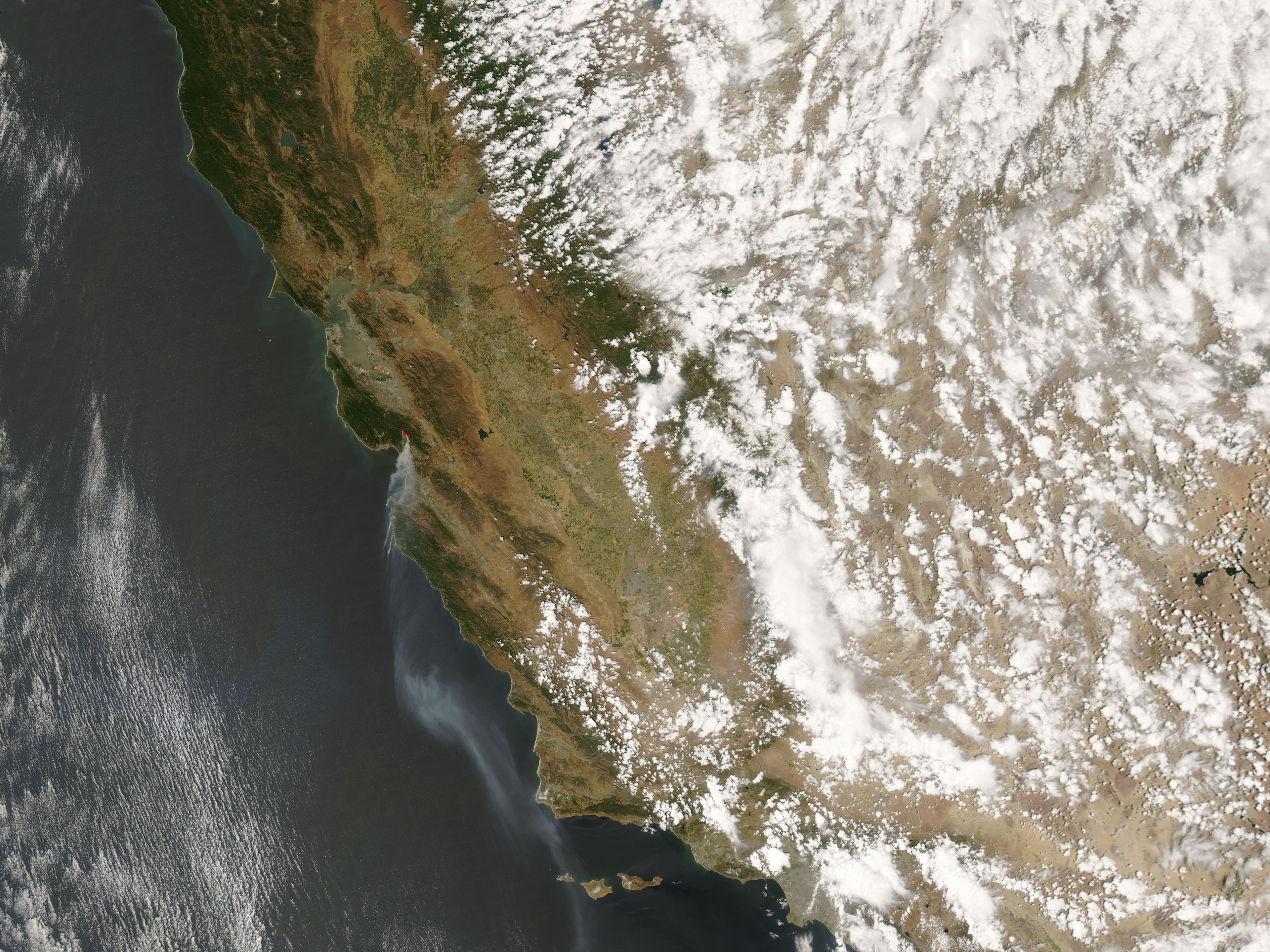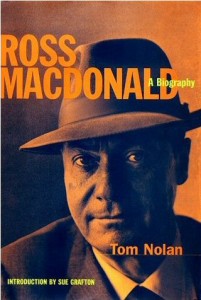“We’re all guilty.â€
Ross Macdonald, The Blue Hammer
 Every fire season in the West I think of Ross Macdonald. In his novel The Underground Man (1971), a wildfire burns an erratic swath through the steep canyons slicing the hillsides behind Santa Teresa, Macdonald’s mythical version of Santa Barbara, threatening to “strike across the city all the way to the sea.†At one time California wildfires erupted in late summer or early fall. Now they happen year-round. The NASA image above, taken May 23, is of the Summit fire east of Santa Cruz.
Every fire season in the West I think of Ross Macdonald. In his novel The Underground Man (1971), a wildfire burns an erratic swath through the steep canyons slicing the hillsides behind Santa Teresa, Macdonald’s mythical version of Santa Barbara, threatening to “strike across the city all the way to the sea.†At one time California wildfires erupted in late summer or early fall. Now they happen year-round. The NASA image above, taken May 23, is of the Summit fire east of Santa Cruz.
Macdonald’s Lew Archer detective novels span 1949-76. The last of them, The Blue Hammer (1976), is more than thirty years old, yet his stories read like yesterday’s news. And Santa Teresa is as much a character as any of Archer’s clients. In Sleeping Beauty (1973) an oil spill from an offshore oil rig threatens a private beach. It’s not just that Macdonald was something of an environmentalist, and held notions about the wholeness of nature, life as a seamless web. It’s that his prose, plain and lucid, let’s you breathe natural air. The physical world of his novels is rendered in precise, economic detail, but it’s a world of shades. Think of his California landscapes as Richard Diebenkorn paintings from which the color has been drained. In The Chill (1961) a murky fog surges through the city, as thick as the novel’s gray-toned plot.
I’m not sure what Macdonald would have made of climate change and other global threats. (He died in 1983.) He was not big on big issues; his focus was on individual responsibility. You see that in his hero and alter ego, Lew Archer. Macdonald is often described as the direct heir of Chandler and Hammett. But it’s more accurate to see Archer as the true heir. Archer reads and admires the hard-boiled crime novels, but with some skepticism about the tough, romantic life depicted in them. He realizes that while the art of private investigation may be morally ambiguous, its actual practice is mundane. Archer is knocked on the head now and then, but for the most part he avoids direct violence. In one revealing instance he is embarrassed when a client catches him aiming an empty target pistol at a rat eating kernels of grain in a bird feeder.
 Archer is passive, except for his persistent questioning, even when he’s not on a case. One woman turns on him. “All you do is ask questions,†she says. “I’ve always known about voyeurs. But you’re an auditeur, aren’t you?†He responds by asking a question and another after that. And Archer’s people are eager to answer, unburden themselves. He’s their “last chance for gas before the desert†of what threatens to overtake them. And they’re talking to the saddest man ever.
Archer is passive, except for his persistent questioning, even when he’s not on a case. One woman turns on him. “All you do is ask questions,†she says. “I’ve always known about voyeurs. But you’re an auditeur, aren’t you?†He responds by asking a question and another after that. And Archer’s people are eager to answer, unburden themselves. He’s their “last chance for gas before the desert†of what threatens to overtake them. And they’re talking to the saddest man ever.
Archer appears in eighteen novels and one book of short stories. By the time we meet him in the first, The Moving Target (1949), he’s a divorced former cop. And we learn little more about his past. That’s interesting because Macdonald’s plots, intricate and vaguely plausible, usually involve the burden of the past. Current murders echo old murders, old passions, old wounds that haunt the present. Archer’s cases open “up like fissures in the firm ground of the present, cleaving far down through the strata of the past.†Archer’s good at spotting the “fishhooks which trailed their broken lines into the past.â€
In his last appearance, in The Blue Hammer, about sex and murder in Santa Teresa’s idolatrous and incestuous arts community, Archer explains what this obsession with the past has taught him about life. “Certain things†are fated, he says. “By the place and the time and the family you’re born into. Those are the things that fate most people.†All a person can do is “react against†family, place and time. Or try to. In a Lew Archer murder mystery, this usually means, for the victimizer, accepting responsibility, and, for the victim, abjuring the impulse to seek revenge.
In The Underground Man a preacher explains that “the past can do very little for us–no more than it has already done, for good or ill—except in the end to release us. We must seek and accept release, and give release.†Meaning, in typical American fashion, reinvent yourself and move on with a clear conscience. That’s a bit too pious, and too convenient, for Archer, who acts more like a psychiatrist. Staking his give-and-take questioning against the tit-for-tat of revenge, Archer subscribes to a secular, mechanistic version of the preacher’s moralizing: “I was watching the cogwheels of the universe turning. It resembled, on a large scale, one of those boxes of gears that engineers fool around with in their spare time. I seemed to be able to see the whole apparatus at once, and to understand that the ratio of output to input was one to one.â€
One-to-one ratio. How’s that work in moral terms? Get back what you put in. Get what you deserve. Live and let live. Carry out what you carry in. I can’t find a real balance in any of those equations. Perhaps in Archer’s day it was still possible to weigh actions in terms of individual responsibility and feel some sense of satisfaction in choices made. Though Archer, even in his forties, wakes with a sense of dread, questioning if his life is slippage more that solid-footed achievement. “You went on making it, or trying to, all your life—working your way up the same old terraced slopes with different street names on them.â€
I think Macdonald would have recognized that one-to-one ratios no longer apply (if they ever did). Our Vibram footprint is much heavier. The weight carried in the world on our behalf diminishes individual recompense. But if collective burden “fates†us, it is still the single consciousness that wakes us to it each morning.
At any rate, Macdonald fits one of my moods perfectly. He used the ink of Melancholy, a fine drizzle of it, steady and sad in each novel. With only a few of the Archer novels left to read, is it any wonder that I’m feeling nostalgic? So to delay the end, I’ve started over, reading, this Memorial weekend, The Zebra-Striped Hearse (1962), the sleekest and most sophisticated novel of those I have read, which takes Archer out of his mundane world to Malibu, Mazatlan, and Lake Tahoe. Now that’s a trip worth taking again (and no $4.00 a gallon gas, either).
*NASA image courtesy of MODIS Rapid Response Team, May 23, 2008.
*Book cover image from Ross Macdonald: A Biography by Tom Nolan, introduction by Sue Grafton, whose “alphabet novels” are set in “Santa Teresa.”